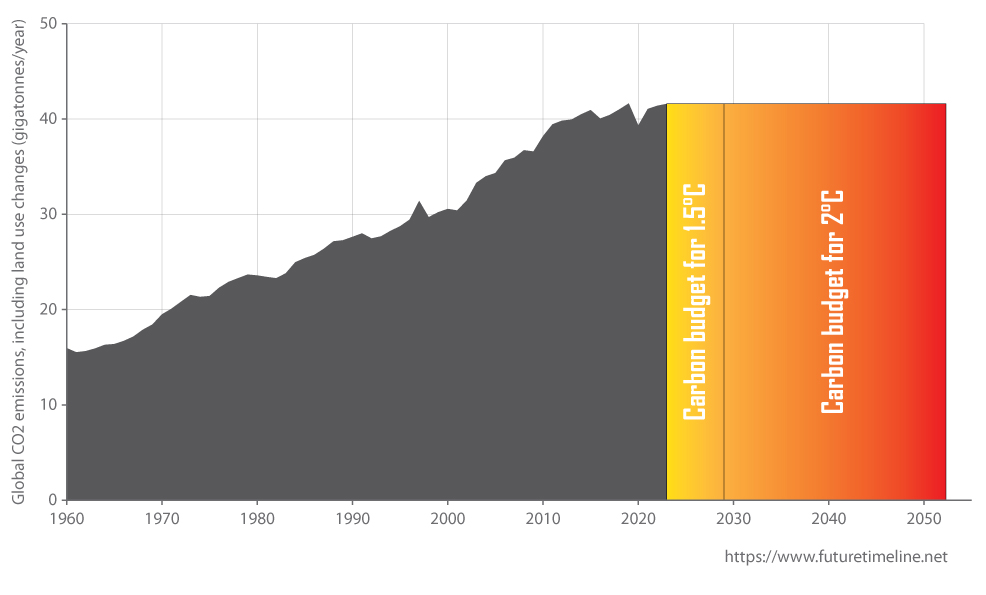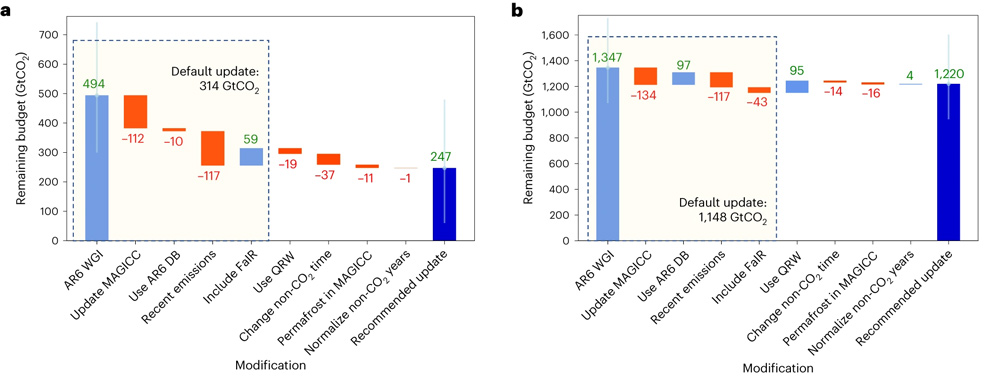
10th November 2023 Carbon budget for 1.5°C will be exhausted by 2029 The remaining carbon budget for preventing a global average temperature rise of 1.5°C is now only half that of previous estimates, at less than 250 gigatonnes of carbon dioxide, or around six years of annual worldwide emissions.
The world has even less time to shift away from fossil fuels than previously thought, based on a fresh calculation of global emissions. Without a massive and rapid reduction in carbon dioxide (CO2) emissions, the world has a 50% chance of locking in 1.5°C of warming before 2030, according to new research led by a team at Imperial College London. Their study, published in Nature Climate Change, is the most up-to-date and comprehensive analysis of the global carbon budget. The carbon budget is defined as the amount of CO2 emissions that can be safely emitted while keeping global warming below certain temperature limits. The Paris Agreement, adopted by 195 countries in 2015, aims to limit the global temperature increase to well below 2°C above preindustrial levels and pursue efforts to limit it to 1.5°C. The remaining carbon budget is commonly used to assess progress against these targets. The new study estimates that for a 50% chance of limiting warming to 1.5°C, there are now 247 gigatonnes of CO2 left in the carbon budget. This means that if CO2 emissions remain at 2023 levels of about 41 gigatonnes per year, the carbon budget will be exhausted by around 2029, committing the planet to warming of 1.5°C above preindustrial levels. The revised budget is now just half its 2020 level of 494 gigatonnes. The researchers attribute this change to several factors – including the continued increase of global greenhouse gas emissions, as well as improved measurements of the cooling effect of aerosols. The latter are decreasing globally due to measures to improve air quality and lower emissions, such as the cap on sulphur used in ship fuels introduced in 2020. For staying below 2°C, the budget is 1,220 gigatonnes, which on current trends could be exhausted by the late 2040s.
a) Carbon budget for 1.5°C. b) Carbon budget for 2°C. Credit: Lamboll, et al. (Nature Climate Change, 2023)
"Our finding confirms what we already know – we're not doing nearly enough to keep warming below 1.5°C," said Dr Robin Lamboll, research fellow at the Centre for Environmental Policy at Imperial College London, and lead author of the study. "The remaining budget is now so small that minor changes in our understanding of the world can result in large proportional changes to the budget. However, estimates point to less than a decade of emissions at current levels. The lack of progress on emissions reduction means that we can be ever more certain that the window for keeping warming to safe levels is rapidly closing." There has been much uncertainty in calculating the remaining carbon budget, due to the influence of other factors, including warming from gasses other than carbon dioxide and the ongoing effects of emissions not accounted for in models. This new research used an updated dataset and improved climate modelling compared to previous studies, characterising these uncertainties, and increasing confidence around the remaining carbon budget estimates. "Every fraction of a degree of warming will make life harder for people and ecosystems," said Dr Lamboll. "This study is yet another warning from the scientific community. Now it is up to governments to act." The issue is more important today than ever. This year is set to be the hottest since records began, and the global average temperature rise may already have surpassed 1.5°C, at least temporarily, as the latest El Niño continues to develop. During the 2030s and perhaps even sooner, this level of temperature rise may become the norm every year. Unfortunately, there seems to be little or no sense of urgency among world leaders. Despite repeated pledges of action, they continue to approve a raft of new fossil fuel projects. The Biden administration, for example, has greenlit the Willow Project in Alaska, which involves the drilling of 200 oil wells across three sites for up to 30 years. Its total CO2 output will be equivalent to creating about 70 new coal-fired power plants. Meanwhile, the United Kingdom under PM Rishi Sunak has recently sparked controversy by announcing more than 100 new oil and gas drilling projects, including the largest untapped field. Despite a change of government last year, Australia is also pressing ahead with over 100 new fossil fuel projects, which together may add 4.8 billion tonnes of emissions by 2030. The rollout of solar and wind power, electric vehicles, utility-scale batteries, and other clean tech offers hope. But even the rapid progress on these projects will almost certainly be too slow to prevent 1.5°C and quite possibly 2°C. Beyond that, the warming may start to become catastrophic and uncontrollable. The increasingly obvious impact of humanity on Earth is a reminder of the extraordinary times we live in. Anatomically modern humans first emerged about 200,000 years ago, in small groups of hunter-gatherers with almost nothing in the way of technology. In the 2,000 centuries since then, our population has mushroomed to more than 8 billion. We have become the dominant species on the entire planet – building vast cities, and transforming the land, seas, skies, and even space with our activities. Most of the impact has occurred within a single human lifetime. This conquering of the world has been so great, and so successful, it may ironically be our undoing, with overshoot triggering a cascade of crises from which we never fully recover. But on the other hand, these dangers also present enormous opportunities. As we approach this pivotal moment – transforming our industries and societies, guided by the power and speed of artificial intelligence – the next few decades could be the most important in our history.
Comments »
If you enjoyed this article, please consider sharing it:
|








